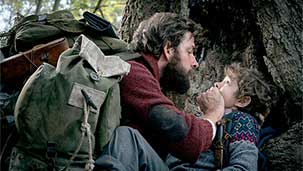Dear Fellow Critics,
Ridiculous, right?
In a year filled with so many consequential and artful films, a middlebrow genre picture, aspiring to not much more than precisely 130 minutes of entertainment, might seem an odd choice.
But.
That is only true if you believe that someone else can shade your choices about what moves or compels you. Because movies aren’t just about what you see on the screen: to be broken down into discrete units of analysis, to be described and then embraced or discarded by tomatometers, or Twitter groupthink, or even people like me trying to tilt you one way or another.
Movies are singular experiences. Each person watching brings their own criteria, prejudices, biases, experiences, and assumptions to the dance. The idea that you can take an experience that’s so utterly subjective and try to create hierarchies of good or bad, great or not so great, consequential or facile and banal seems to me to be tilting at a windmill of Cervantes-like proportions, if not completely pointless.
There may be ends of this particular Bell Curve that are hard to argue with: films so abysmal that it requires a kind of rhetorical genius to even begin to make the case, or films so brilliantly realized that they blind you with their light and heat. But those are drops in a very large bucket. Most of the rest exist in a space with no up or down, no depth or weight, or point of reference other than your own, where the only place to make a judgement is completely relative.
Having said all that, here I go. Because like some conversations about religion or politics, The Best Of donnybrook may be without end, but it isn’t always without value.
My experience of A Quiet Place began with more of a whimper than a bang. If I’m a scholar of anything, it’s the fictional apocalypse and its aftermath. Novels, films, even music—there aren’t many versions of the end of the world as we know it, regardless of place of origin, that I haven’t at least a passing knowledge of. So the bug/monster-infested-countryside, family-in-peril-after-an-ambiguously-sourced-disaster wasn’t new. And while an original take isn’t necessary for me to enjoy this kind of film, it helps.
I’m not a big fan of John Krasinski either, a prejudice borne of my dislike of the American version of The Office and how watered down and deballed it seemed. Emily Blunt is certainly a competent actress but I’m often kind of meh about her, and the fact that they’re a celebrity couple that spend a lot of time weaponizing that relationship doesn’t help. Oh, and I generally dislike films where kids between 8 and 15 are featured prominently. And when I say dislike, hate is probably more accurate. Especially in thrillers or horror they are so often reduced to bait, a cheap vehicle to create tension, and are usually cast with an eye towards some kind of warped stereotype of the American heartland. Blech.
I’m also not a parent, and a lot of the admittedly shallow subtext contained within A Quiet Place leans into the tension between the freedom you allow your child in a dangerous world and the degree to which you try to shield them from those dangers and their larger implications. So even the emotional hook they were employing to deepen the experience was something that really doesn’t have much resonance with me.
In short, my personal experience, biases, assumptions, criteria, predisposed me towards a big old thumbs down for A Quiet Place.
And yet.
Movie magic is one of those terms that seem to ooze out of certain critic-fossils, in-between bouts of rimming whoever happens to serve their ends. It’s sad because it taints what is a pretty good descriptor of what Krasinski (who also directed and co-wrote this film) manages to achieve.
He steps gently on enough tropes, and subverts them without being overt, in a way that surprises and removes any kind of certainty about where the story may be going. The cinematography serves the story as opposed to making itself known, but it is perfectly attuned to the entire aesthetic. The performances are a couple of notches above good enough that they are unnoticeable in both a flashy or just bad way. The kids are okay, although that is saying a lot for me. And most notably for a film that could easily lean on jump scares and monster reveals to create tension, the film is even more compelling on second and third viewing, even when you know what’s coming.
This is a film that gets better the more times you watch it. And it also achieves something that often ruin otherwise pretty good films. Krasinski knows exactly how long this film should be. That may seem like a small thing but it can be the difference between good or bad or even really good and just ok.
Mostly though, this film just doesn’t betray itself. It’s in sync with its own intentions the whole of the runtime. A Quiet Place is engaging and smart without feeling manipulative or clever for the sake of being clever. It is film that manages to truly entertain and even stands up to repeated viewings. More than anything else though, it is a perfect pop song (Sabotage), neither too short or too long, filled with references to all sorts of other works but still its own thing, familiar but original, and finally, really goddamn good.
But hey, that’s just me.
Tim




